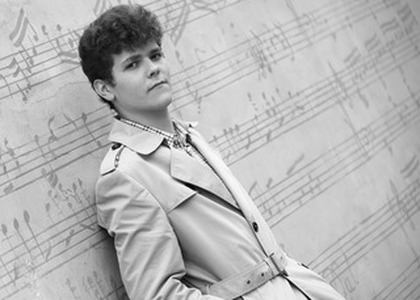> Interviews

Interview with pianist Szymon Nehring
Szymon Nehring will be the soloist in the National Radio Orchestra's concert on Friday, November 7, 2025. The 30-year-old Polish musician will perform Johannes Brahms' Concerto No. 1 for piano and orchestra.
You already have a relationship with the Romanian public, having performed at the Radio Hall, as part of the Enescu Festival, and at the Romanian Athenaeum earlier this week. You are returning as a soloist with the National Radio Orchestra, with whom you last collaborated almost 10 years ago. What memories do you have from that time? How would you describe your relationship with conductor Cristian Mandeal?
I remember playing Chopin's Concerto No. 1 here at the Radio Hall nine years ago, and it was wonderful! Of course, it wasn't easy to play in this hall, but I remember the collaboration and the overall feeling that it had left me with, and the concert itself was fantastic. And now it's even better, because I think I have a lot more experience and can better cope with the challenges of the acoustics, which don't really help you. I really enjoy working with maestro Mandeal, I feel very comfortable around him. I also think that the orchestra is a wonderful organism that works very, very well, which is particularly difficult in the case of Brahms' Concerto No. 1.
So, both this piece and the acoustics are a great challenge, elements which make the performance very difficult. But at the same time, I feel great joy in playing with a wonderful ensemble like this orchestra!
Brahms' Concerto No. 1 has been described as a piano symphony. Do you agree with this statement?
Yes, it is certainly very important to listen to the orchestra and be part of this great whole. I think the juxtaposition of the piano with the orchestra is also very important, but I also think without a doubt that these Brahms concertos should be treated as symphonies. The experience of playing with the orchestra and listening to the ensemble is crucial when performing these works and the amount of energy you have to invest is greater in order to give them that much-needed spirit and natural flow at the same time. I think this is another challenge that always arises when performing Brahms' concertos in particular, to integrate yourself into this organism, that is. It is very important in the case of these pieces for someone to do this during a concert, or at least succeed to do so to some extent.
How do you convey the elements of your performance to the orchestra in just one or two rehearsals?
We don't talk too much and everything comes naturally from the logic of the music, and if there is understanding on a musical level, then discussions make this process more difficult. Of course, some passages need to be discussed and perhaps repeated a few times, because the score can be interpreted differently. This always happens during certain moments within the pieces, especially the well-known moments, but in general the creation comes from understanding the score and playing together, which sometimes happens at a higher level, and sometimes at a lower level.
But there is always the inner dialogue, the silent communication that takes place between the soloist, the instrumentalists, and the conductor; I think these are even more intimate than words. I am also happy to return to Bucharest, and the dialogue I have with the orchestra and the conductor is very inspiring.
You have recorded piano solos and chamber works by Chopin. What does Chopin's music mean to you?
There are many composers who are very close to my heart. Chopin is certainly one of them, and I have begun recording all of his works for the Chopin Institute in Poland. The second CD in this series is about to be released.
It's hard for me to explain what it means to me; I think that's why we play music, so we don't have to convey it into words. But he is certainly one of the composers closest to my heart, and his music is at the center of my passion. His music presents such a diverse emotional spectrum that I consider it an endless search for the depth of music, and this brings him closer to the image of the genius that he is. So, I will continue my journey through Chopin's music!
You have met Penderecki and even performed concerts together and recorded his Concerto for Piano and Orchestra with him as conductor. How would you describe that experience?
Yes, it was fantastic! It was an extraordinary opportunity to work with a great contemporary composer who was able to tell me how he would like his work to be interpreted, although he was not the kind of person to impose an interpretation style on me. He was one of those composers who believe that writing the score is the composer's job, while interpreting it is the performer's task. So, he didn't impose many things on me, but the fact that I was with him and that he was my conductor when we recorded this piece meant a lot to me! And even though he didn't talk much, his energy as a musician and his nature were, of course, very, very inspiring to me.
Translated by Andrada-Teodora Ivanov,
University of Bucharest, Faculty of Foreign Languages and Literatures, MTTLC, year I
Corrected by Silvia Petrescu














